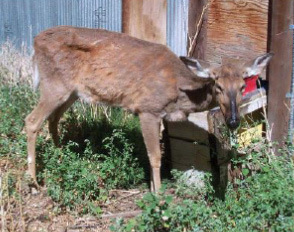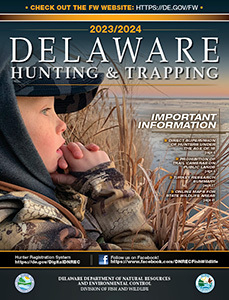Chronic Wasting Disease
What is CWD?

Chronic Wasting Disease (CWD) is a naturally occurring disease of the brain and nervous system in deer, elk, and moose. CWD attacks the brain of these animals producing small lesions that eventually result in death. The body condition of animals that contract CWD tends to deteriorate before death. Currently there is no treatment for deer that contract CWD and is invariably fatal to the animal. No cases of human infection have been associated with CWD. Since 2002, the Division has collected nearly 10,000 CWD samples from deer harvested in Delaware and none have been positive for the disease.
Laws and Best Management Practices Pertaining to CWD
It is far easier and less expensive to implement precautions that minimize the risk of CWD infecting the Delaware deer population than it is to manage the disease after it has been detected. There are several things that individual hunters can do to minimize the chance of CWD spreading to our state.
It is unlawful to import or possess any carcass or parts of a carcass of any member of the family Cervidae (deer, elk or moose) originating from an entire state or Canadian province or portion thereof, as described by the Delaware Division of Fish and Wildlife in which CWD has been found in free-ranging or captive deer. Notwithstanding the foregoing, the following parts may be imported into the state:
- Boned-out meat that is cut and wrapped;
- Quarters or other portions of meat with no part of the spinal column or skull attached;
- Hides or capes with no skull attached;
- Clean (no meat or tissue attached) skull plates with antlers attached;
- Antlers (with no meat or tissue attached);
- Upper canine teeth (buglers, whistlers, or ivories); and
- Finished taxidermy products.
Regionally, the states of Maryland, Pennsylvania, Virginia, and West Virginia have confirmed the presence of CWD. From these states, hunters are restricted from bringing entire deer carcasses and may only bring the above mentioned parts from the counties in which CWD has been found. If hunters are hunting in portions of these states outside of those areas, they are not restricted from bringing their harvest back to Delaware.
- Maryland — Allegany, Carroll, Frederick, and Washington Counties
- Pennsylvania — Adams, Armstrong, Bedford, Berks, Blair, Cambria, Centre, Clarion, Clearfield, Columbia, Cumberland, Dauphin, Elk, Franklin, Fulton, Huntingdon, Indiana, Jefferson, Juniata, Lancaster, Lebanon, Lycoming, Mifflin, Montour, Northumberland, Perry, Snyder, Somerset, Sullivan, Union, Warren, and Westmoreland Counties
- Virginia — Clarke, Culpeper, Fairfax, Fauquier, Frederick, Floyd, Loudoun, Madison, Montgomery, Orange, Page, Pulaski, Rappahannock, Shenandoah, and Warren Counties
- West Virginia — Berkley, Grant, Hampshire, Hardy, Jefferson, Mineral, and Morgan Counties
CWD has been detected in 29 states and 3 Canadian provinces. For a complete list of restricted areas within other states please visit http://cwd-info.org/ or contact the Division at 302-735-3600.
Any person who imports into Delaware any deer carcass or parts of a deer carcass (e.g. antlers, meat, hide, etc.) that was tested for CWD by another state and is notified that the animal has tested positive for CWD must report the test results to the Division within 72 hours of receiving the notification by calling the Division at 302-735-3600.
For a complete list of restricted areas within other states please visit the websites above or contact the Division at 302-735-3600.
CWD may be present in some locations but it hasn’t been detected by natural resource agencies. Therefore, all hunters should properly dispose of all portions of their carcass not consumed or used for taxidermy purposes. The parts that remain after processing a deer for consumption are considered household waste and hunters should dispose of the skeleton, hide, and scraps in a sealed trash bag and place it with the rest of their household waste for transport to a landfill. Do not dump your butchering scraps on the ground as wild deer in Delaware could come in contact with these parts and if the animal that was processed had CWD, the wild deer could become infected after coming into contact with the scraps you put out on the ground.
The biological material responsible for infecting deer with CWD can be spread through urine, among other materials. Many hunters use natural deer urine as an attractant while deer hunting. If used improperly, hunters could unknowingly be infecting the areas they hunt with CWD. Short of not using deer urine while hunting, hunters should take the following precautions to minimize the chance that deer will come in contact with these products.
- Use attractants that do not contain natural deer urine as an ingredient or use synthetically produced products as a replacement.
- Do not pour or dispense natural deer urine on the ground or in a place where a deer could come in contact with the product. A better approach when using natural deer urine as an attractant, would involve saturating a scent wick, cotton ball, or other material with the urine and then hanging the item on a branch high enough that it is out of reach of a passing deer. At the end of each hunt, remove your scent station from the field so that deer are unable to come in contact with the lure.
For More Information on CWD
Additional information on CWD can be found at the CWD Alliance website www.cwd-info.org and on the Delaware Fish and Wildlife website https://de.gov/fw.

